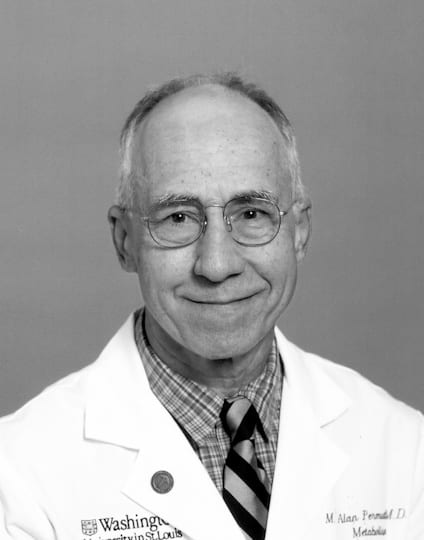
Dr. Permutt, Professor of Medicine and of Cell Biology and Physiology, was a world leader in the study of the genetic basis of diabetes having identified the first gene that plays a role in Type II diabetes and another that contributes to a rare form of insulin dependent diabetes called Wolfram syndrome.
He grew up in Birmingham, Alabama and graduated from Johns Hopkins in 1961. During medical school at Washington University, Permutt met William Daughaday, MD, who encouraged him to do research. Permutt subsequently won the 1965 Borden Prize for Medical School Research. Permutt then went on to complete an internship in medicine at Yale New Haven Hospital and a residency and postdoctoral fellowship (1967-69) in medicine and microbiology at the University of Washington in Seattle.
Permutt returned to Washington University for another, special NIH fellowship in the laboratory of Dr. David Kipnis. There he began his lifelong pursuit of fundamental questions about the origins and treatment of diabetes, work driven in part by his own juvenile diabetes.
Permutt joined the faculty as an Instructor in Medicine in 1970 and rose to the rank of professor in 1985. He directed an Institutional National Service Research Training Program in Endocrinology and Metabolism from 1985 through 2007, and he directed the University’s Diabetes Research and Training Center (DRTC) from 1997 through 2007.
In 1992, Dr. Permutt and his colleagues were the first to demonstrate that variations in the glucokinase gene could cause type II diabetes. That finding connected complex genetic linkage and molecular biology studies to a common, chronic disease.
In 1998, he and collaborators discovered WFS1, a novel transmembrane protein that, when mutated, causes Wolfram syndrome, characterized by neurodegeneration and beta cell death.
NIH honored his work in insulin biosynthesis with MERIT (Method to Extend Research in Time) Status Awards initially in 1986 and, again, in 1998. Also, Dr. Permutt received the 1995 David Rumbough Award from the Juvenile Diabetes Foundation International for his commitment and achievement in diabetes research, and the 2009 Paul Lacy Medal from the Midwest Islet Biology Club for outstanding scientific achievement. Professional society memberships included the Association of American Physicians, the American Society for Clinical Investigation, the American Diabetes Association (ADA), the International Diabetes Foundation, the Juvenile Diabetes Research Foundation (JDRF), and the American Society of Human Genetics. His editorial responsibilities included Current Diabetes Reviews, Diabetes Research and Clinical Practice, and Diabetes. Dr. Permutt served on many scientific review boards and advisory committees for NIH, the American Diabetes Association, and the JDRF.